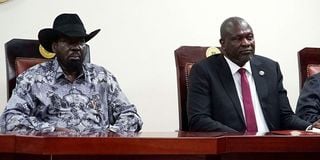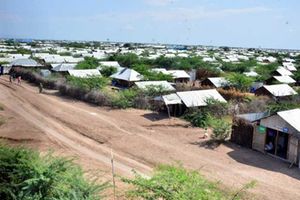
South Sudanese President Salva Kiir (L), and South Sudan's opposition leader Riek Machar at a past event.
South Sudan’s collapsed talks in Nairobi may still save it from anarchy, in what may reflect the crucial bits that delegates had already agreed on before they fell out and which were more important for the country’s stability.
The talks have been going on in Nairobi since May 9, but were halted last month after the representative of the Sudan People’s Liberation Movement-in-Opposition (SPLM-IO) walked out. They argued that the protocols under discussion would undermine the principles of the 2018 peace deal, officially known as the Revitalised Agreement on the Resolution of the Conflict in the Republic of South Sudan (R-ARCSS).
R-ARCSS was signed between President Salva Kiir’s SPLM and SPLM-IO and several other political factions, after which they created a government of national unity. The talks in Nairobi were meant to bring in groups that had stayed away from R-ARCSS.
Yet while walking out by SPLM-IO may mean a deal to accommodate the groups in the government of national unity may delay, it may influence a general focus on transition.
Before the withdrawal of SPLM-IO led by Dr Riek Machar on July 12, the Nairobi Dialogue—commonly known as the Tumaini Initiative—had agreed on eight protocols.
They include; Confidence-Building Measures; Communal violence and Land Issues; Justice Sector Reforms, Transitional Justice and Accountability; Security Sector Reforms; Permanent Constitution Process; Economic Recovery; Humanitarian Access and Support; and Responsibility Sharing.
Dr Cirino Hiteng, a member of the Implementation Committee who also represents Pagan Amum’s Real-SPLM, one of the hold-out groups, the parties now need to work on what he called an implementation matrix which he said parties had agreed to discuss.
“The parties have been working on the implementation matrix where I sit with others representing the opposition. The negotiations are only left with responsibility sharing and the matrix, otherwise the talks are almost done,” said Dr Hiteng.
Declaration of Commitment
The SPLM-IO, led by Dr Machar, claimed the discussions in Nairobi would duplicate the implementation of the 2018 peace deal. SPLM-IO is already in the government of national unity where its members also serve as ministers.
When talks began, parties signed the Declaration of Commitment on May 11, clearly identifying the areas of focus.
The SPLM-IO—joined the talks later as part of the Transitional Government of National Unity (TGoNU) led by President Salva Kiir. Machar’s party had demanded to be recognised as a distinct entity was ignored by Mediator Lazarus Sumbeiywo.
Nairobi talks actually relocated from Italy, where the Sant’ Egidio Catholic Community in Rome had first initiated dialogue in 2020. Back then, it involved the TGoNU, the holdout group that did not sign the 2018 peace agreement—the South Sudan Opposition Movement Alliance (SSOMA)—and the civil society groups.
The Coordinator of Gen Paul Malong’s South Sudan United Front (SSUF), Lual Dau who is also the secretary of SSOMA, accused Dr Machar of not getting the correct briefing from the SPLM-IO political Bureau on the nature of the talks.
“SPLM-IO has always been part of the Rome Initiative represented by two senior ministers and a member of parliament. From where we have reached having had consensus on all protocols, we don’t want Tumaini Initiative to be the source of another war in South Sudan,” said Mr Dau.
The Tumaini Initiative was divided into two sections. The first section, which is completed, addressed what was termed the “Rescue Plan” which included preparing the country for credible elections; the completion of security sector reforms; and judicial reforms to deal with electoral disputes.
Others are ensuring that refugees in foreign countries and the internally displaced return to their homes; and revamping of the National Election Commission—which currently comprises the representatives of political parties only. Officials said there was little fallout on these issues.
The second section, which is yet to be fulfilled, is to hold a donor conference to raise funds for the implementation of the protocols, including the holding of the first general elections.
The second section also seeks to streamline the management of South Sudan resources, both from oil and non-oil revenue, especially agriculture, mining and tourism.
Unnecessary diversions
Akol Miyen Kuol, a South Sudanese author and a political commentator, said that the Tumaini Initiative has now reached a stage where President Kiir and Dr Machar must attend physically to give guidance and avoid unnecessary diversions.
“That is the only best way to rescue the peace process and take it to a successful conclusion in the shortest time possible,” said Kuol.
Judging from the current developments, it appears that the country is looking at another extension of the life of the Transitional Government, because the country cannot hold credible elections in December without a new constitution and the completion of the security sector reforms.
Dr Hiteng agrees that the December elections are unlikely and the country will be forced to go for what he termed as “Triple Final”, the final extension.
“The decision to extend will be dictated by the outcome of the Tumaini Initiative which is self-executing. Tumaini is a tsunami that seeks to correct all the previous ill and is almost equal to the landmark 2005 Sudan Comprehensive Peace Agreement,” said Dr Hiteng.
He maintains that the outcome and the implementation of the Tumaini Initiative will be revolutionary, in which both President Kiir and Dr Machar will not participate in the elections.







